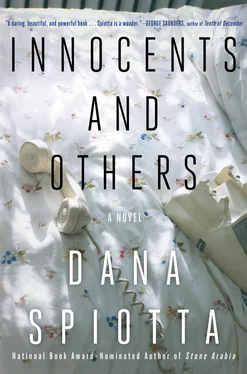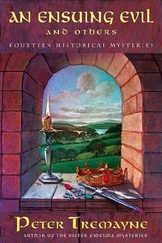“Of course they had undercover people in there. The agents are always the ones urging everyone to violence and mayhem. They wanted to discredit the student activists.”
“But all they did was make the students into victims.”
The professor shrugged and smiled. “I didn’t say it was smart or effective. It was the FBI.”
But some of the members of the Guard also believed it.
“If you listen to the tape, the audiotape, you can hear a lone shot before we kneel and shoot.” It was true. There was no video, but an audiotape existed, made by a student doing a project in which he kept a tape recorder on his dorm room windowsill. It was very staticky — the audio version of grainy — full of pops and cracks. Meadow included it in the film, played it while showing a black screen. She put titles on the black screen to point to sounds. Somebody is talking and words appear in large typed letters as you hear them: You and after they come and taken and tell them and then when you hear the supposed shot, (gunshot) , a pause of blank screen, (running) , then a word that sounds faintly like ready. Then (garbled) , seconds go by on blank screen, then (shots, screams).
It is true that the isolation of sounds on a blank screen can deceive, that anything isolated in a sense-depriving way can feel odd or wrong no matter the content. And suggesting what a sound is makes you hear that sound. Meadow knew that. She also knew that once the provocateur was mentioned, she would bring him up to each person she interviewed. She would sometimes put her question about him in the film. Other times she would discuss it with the person before the filming— you know what, several people have said this. And the person would get around to mentioning it when she filmed the person talking. But she already had fake film mixed with real film. Her film was a stylized, constructed thing, a version of reality. Not a pure, untainted object. You cut, you put this next to that, you edit this out, you ask, you enact, you show an image. It was a fictiony thing: a fictional thing comprised of pieces of real life. A hybrid, a combine. Only one line of events actually happened, but it was obscured by memory and time and wishful confabulations. She wanted to convey that.
Slowly the film bent toward a conspiracy, with one person after another circling back to the saboteur, essentially blaming him as ultimately responsible. The Guard turned for a reason, and maybe this was it. The belief was that most of the violence on the student left was instigated by fellows like him. And truly, there was a guy lurking around Kent State who appeared to be protected by the FBI. He was always at meetings, always taking photographs. He was off in obvious ways. People felt that he was some kind of narc. And the Guardsmen were sure someone fired at them — they wouldn’t be ordered to shoot actual bullets because of a few rocks. Although the rocks hurt — a number of Guardsmen claimed to have sustained injuries from rocks. And from chunks of cement and gas canisters. (“A rock could kill a person, you know. We were the same age as the students, but we didn’t go to college. We were enlisted or drafted, lucky to be stateside in the Guard. Lucky!”)
Eventually Meadow understood where the film should go. She had been filming for a year already. It took another year to locate and talk to him. He was easy enough to convince to speak once she found him in a Boston suburb. He had always lived with a hum of doubt under him. “I will talk to you.” He was pained — no one got more contempt in this world than the turncoat. Misguided true believers? Fine. But the deceiver, the liar, the betrayer? Everyone was united in their hate for Marvin Joseph.
Marvin lived in a small brick split-level house on a suburban street lined with old oak trees. She would film Marvin, and Marvin alone, in his living room, where his ordinariness was palpable. People would expect a fully satisfying narrative, a bad guy. But she would give them the unknowable, the meaningless. The mistake.
“Is this okay?” he said. He was wearing a dress shirt under a wide-lapelled blazer. He was chubby and wore outdated aviator frames that made him look, with his tight shirt, a bit like a porn producer. This was not right. Meadow found him a looser shirt, a more conservative blazer. She didn’t suggest he shave his sideburns, but she asked him to take off his glasses. So the lights won’t reflect so much, she told him. She expected him to be squirmy and deny everything, not convincing, but his apparent powerlessness would mark him as a scapegoat for the regrets and wishes of the others. No matter what he said. But instead he gave a speech, something entirely born for the camera. And in minutes he had rewritten his life.
“Here is why I wanted to talk to you,” he said. He leaned in, looked directly into the camera.
“I didn’t fire a shot at the Guards,” he said. “But I did work for the FBI.” He had never publicly copped to being an informant before. Meadow felt a tingle on the surface of her skin. She looked at him and didn’t say a word. Let him. As he spoke, his face grew animated and his features became more defined. “I was a photographer. I was not a radical, not a student. I liked to photograph them at protests. They looked interesting; they were so passionate. Occasionally scary. Often beautiful — they were all young and beautiful.” He paused, as if he were remembering.
“I was known as someone who took pictures, and the FBI asked me for some of my photos. It is true. I complied; I don’t deny it. I was scared of the FBI, everyone was. I let them have my photographs. I took money for the photos, it is true.” Marvin looked down for a moment. He took a deep breath. “I already had the rap of being an informant. I was older, I was awkward. I didn’t know how to dress like the cool kids. My hair is curly and doesn’t look good long, really. So I was already an outsider. And I tried to impress a girl once by saying the FBI bought my photos.” He laughed bitterly. “I was a little naive about it. Not political at all, which condemned me in any case. I did not win the love of this girl, and from then on I was marked as an agent provocateur. I didn’t even know what that was.” He shook his head. And then came the astonishing part. Big cinematic tears started to flow. Not the sobby, messy kind, but elegant tracks of teardrops on cheeks: a clearly visible indication of emotion.
“I was on the quad that day, more or less shunned as always. Everyone knew there would be a confrontation, and I was a stringer for some papers. That is how I made a living. I would photograph the protests. And that is all I planned to do.” He stopped and wiped his eyes with a handkerchief. “I did have a gun, it is true. But that is because I’d had death threats. I had already been beaten up once. I didn’t even think it was loaded. I just kept it in case I got jumped, so I could scare people off.”
Marvin paused, and then in a breaking but emphatic voice, he spoke. “I never fired a shot that day. I swear that I did not.” He stopped. “For years now people have been hounding me. I used to get calls in the middle of the night from people telling me that I killed four kids. The police arrested me that day because some of the students attacked me and I pulled out the gun to scare them. But the police report shows that no bullets were fired from my gun. I know people think the report was all fixed by the FBI. What answer can I have to endless paranoia? There is no answer.” He shrugged, and looked down.
“Look, I admit I was an awkward, stupid jerk. That I should have disappeared after everyone made it clear they didn’t want me around. I don’t blame them! I didn’t think of it this way at the time, but the FBI ruined people’s lives. I am sorry I gave them photos. And I am truly sorry for what happened that day, which I witnessed and will never forget. Our kids murdered by our other kids. For no good reason.”
Читать дальше












